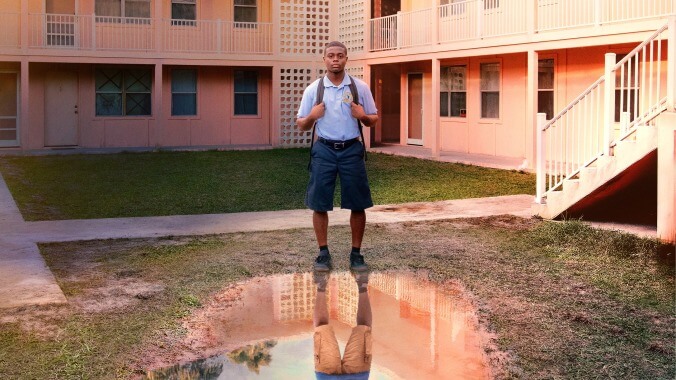

The phrase “like nothing else on television” has earned its rightful place on the master list of hackneyed critical pull quotes, alongside such esteemed company as “fun for the whole family” and “… will leave you breathless.” That becomes a problem upon stumbling onto something like OWN’s coming-of-age drama David Makes Man, a show singular enough to make me regret my role in the dilution of “like nothing else on television.” Even describing it as a coming-of-age story or a family drama—though it’s both of those—feels inadequate given its breadth and fierce experimental streak. David is one of those shows that precedes the pithy genre descriptor that will eventually define it.
Perhaps that’s because the show was created by Pulitzer- and Oscar-winning playwright Tarell Alvin McCraney, who’s best known for helping Barry Jenkins transform one of his acclaimed stage plays into 2017 Best Picture winner Moonlight. McCraney’s strength lies in the cultural specificity he brings to his stories of young Black boys with the weight of the world on their shoulders, and David Makes Man is an execution of McCraney’s vision more potent than the movie or the plays that define his career. In fact, an early quibble I had with the show was how topically and thematically similar it is to Moonlight, which for many was a first glimpse into McCraney’s semi-autobiographical work. All the same elements are here: Black bodies saturated with cool-colored light; muggy Miami and its rough-and-tumble housing projects; financial insecurity born of addiction issues; and father figures as faithful to their selected sons as they are unfaithful to the law.
And yet, while McCraney is working with the same color palette, David Makes Man’s 10 episodes represent the largest canvas he’s ever had to work with. As storytelling mediums go, television is an especially ravenous beast, gobbling up every clever notion the writer’s ever had. That’s what makes David such a testament to McCraney’s talent and his clarity of vision. Television history is littered with examples of estimable novelists and playwrights who stare into the medium’s gaping maw and are left struggling to feed it. Not the case here, as McCraney’s partnership with showrunner Dee Harris-Lawrence has yielded a drama that often feels like it’s running out of places to store its surplus of ideas. (Oblique references to Game Of Thrones and the Portuguese man o’ war can exist in the same conversation.) It’s also the all-too-rare example of meticulous world-building outside of genre fiction, so while David occasionally feels overstuffed, it never feels like it’s wasting precious fuel.
What will stick with me most about my two viewings of David’s first season is the image of the protagonist’s face. There are innumerable moments that press in on or merely sit with the face of 14-year-old David (Akili McDowell). He lives with his mother Gloria (Alana Arenas) and hammy little brother J.G. (Cayden K. Williams) in Homestead Village (a.k.a. “The Ville), which, like so many housing projects, can be a vortex of vice and desperation. When he’s not fulfilling his academic duties at a prestigious magnet school, he’s acquiescing to pressure from small-time drug dealers and processing grief over the loss of a cherished mentor. Rather than rely on dialogue, David is often content to let the conflicting emotions play subtly across the character’s face, which is almost always drenched with sweat, either from Overtown swampiness or anxiety triggered by his many adult responsibilities. Such an approach couldn’t work without an exceptional actor, and 17-year-old McDowell is an absolute marvel. His face is still burned into my retinas.
Maybe having McDowell as a sturdy anchor is what allows David to drift in so many stylistic directions. While the subject matter can be dour, the show has a surprisingly well-rounded tone and makes a concerted effort to inject levity and joy whenever possible. It’s at once naturalistic and impressionistic, portraying the struggles David faces through his magic-tinted lens, which allows him to escape his reality without using the substances that grip so many of the adults in his life. The show leans heavily on David’s rich fantasy life, delighting in visual flights of fancy that wouldn’t be out of place on Random Acts Of Flyness, or, for that matter, Wonderfalls.
Despite winning glowing reviews and a Peabody Award, David’s first season (it’s been renewed for a second) somehow didn’t garner the viewership it deserves. (The prose-y title certainly doesn’t help.) But in a moment when our culture is trying to center stories about Black lives, HBO Max has wisely added the show to its catalog. It’s another chance at life for a show that is—dare I repeat it—like nothing else on television.
4 Comments
transform one of his acclaimed stage plays into 2017 Best Picture winner Moonlight
I don’t think the play had even been produced at the time.
This show is so damn good. I couldn’t believe no one was talking about it when it came out. It’s brilliantly written, shot and acted. I’d easily put it in the top 10 best shows of 2019.
This is such a beautiful show. I strongly recommend it to everyone: the way it explores class, race, abuse, sexuality/gender, and a host of other topics is just masterful. I can’t wait for S2!
I also cannot recommend this enough. Every actor/actress in this project did an amazing job (save maybe Desmond’?) and the writers did a great job of developing the characters.
This show is pretty heavy, but when you are in a good mental space to watch it – it is breathtaking.